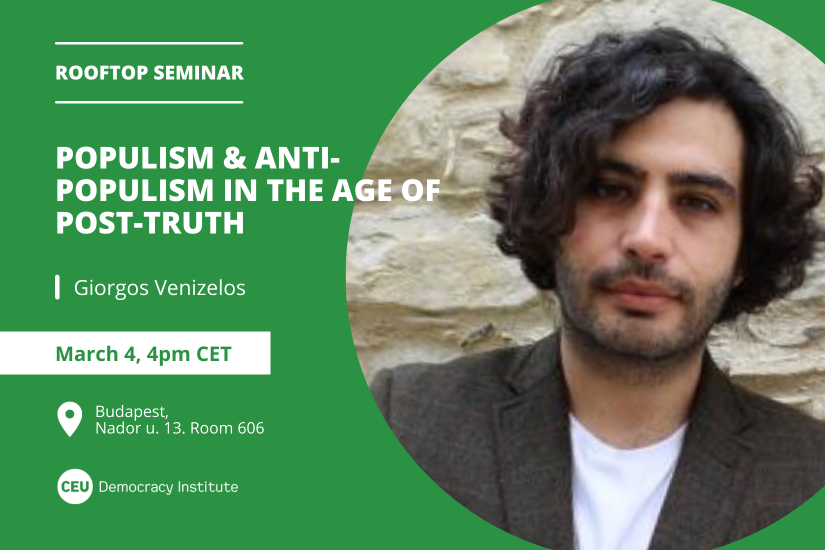
The De- and Re-Democratization (DRD) Workgroup of the CEU Democracy Institute cordially invites you to its next Rooftop Seminar. You can check our past events here.
If you would like to attend, please register here.
Please keep in mind that external guests cannot enter the building without prior registration. Due to space restrictions, attendance is limited. We ask registered visitors to pick up their temporary visiting card at the reception. The event is not open to the press.
If you would like to receive updates about our events, sign up for the DRD mailing list here.
Abstract:
The signifier ‘post-truth populism’ has received prominent role in public and expert discourse over the last decade, gaining further boost since the outbreak of the COVID-19 pandemic. Conventional narratives reveal three overarching assumptions about this ‘new political phenomenon’: (a) that ‘post-truth populism’ posits itself against truth, facts and evidence (b) that it is profoundly emotional rather than rational and (c) that it constitutes a threat to science. However, such an understanding oversimplifies a complex socio-political phenomenon, attributing features to it that are neither constitutive nor exclusive. This theoretical paper argues that the discursive construction of 'post-truth populism' is facilitated by the automatic adoption of an anti-populist perspective as a default point of departure in any discussion about populism. In fact, ‘the post-truth conjuncture’ reveals a novel, reinvented and reified form of (post-truth) anti-populism, understood as a salient, reactive and malleable, yet overlooked feature of political discourse. Despite widespread research on populism and post-truth, scholarly attention remains overly focused on the causes and effects the phenomenon has on polity, policy and politics. Consequently, the role ‘post-truth populism’ plays as a signifier in public discourse is largely unexplored. Adopting a critical ethos, this paper shifts focus from the essential meaning and consequences of ‘post-truth populism’, to the language games surrounding it. Stressing the pivotal role of dominant socio-epistemic structures in constructing knowledge and truth as objective, this article highlights the role political elites, experts and pundits play in post-truth politics. This article concludes that more attention and reflexivity is required when talking about ‘post-truth populism’, in that the wide and uncritical use the term and its a priori association with fake news, mis-/dis-information, anti-vax movements and the like, has both theoretical and socio-political implications. First, the elitism apparent in dominant discourse fails to capture why expert authorities are faced with backlash while conspiracies become popular – even against scientific evidence. Secondly, reactionary forms of anti-democratic and illiberal politics are disguised under the notion of ‘populist’ that functions as a euphemism.
Speaker:
Giorgos Venizelos is a Post-doctoral Fellow in Political Polarization within the De- and Re-Democratization Work Group at the Democracy Institute. His research integrates comparative politics, political communication, and contemporary political theory, primarily focusing on populism in power, anti-populism, collective identities, and social movements. Giorgos is currently investigating the relevance of anti-populism in the post-truth era and the way populism is associated with fake news, and conspiracy theories in expert and commentator discourse. He authored Populism in Power: Discourse and Performativity in SYRIZA and Donald Trump and published in journals like Political Studies, Constellations, Critical Sociology and Representation and various edited volumes. He earned his PhD from Scuola Normale Superiore, MA from Goldsmiths College, and BA from the University of Essex. Before joining CEU, he researched and taught at the University of Cyprus, Aristotle University of Thessaloniki and the Cyprus University of Technology.
Discussant:
Eszter Kovats is a Research Affiliate at the CEU Democracy Institute and a Post-doc at the Institute of Political Science at the University of Vienna. From 2009 to 2019 she was working in the Hungarian office of the German political foundation Friedrich-Ebert-Stiftung. She wrote her PhD about the politicization of the term gender by the German New Right and the Orbán regime in the context of progressive gender trends, and she defended it in the Institute for Political Science at University ELTE, Budapest in 2022. Her book „Genderőrületek Németországban és Magyarországon” (Gender madnesses in Germany and Hungary) was published in September 2022. Her areas of research: anti-gender politics, illiberal Right, illiberal Left.
Chair:
Flora Hevesi is a Research Assistant at the CEU Democracy Institute. She holds an MA in public policy (2023) from Central European University and a BA in international relations (2019) from Corvinus University of Budapest. During her studies, she was a member of Rajk College for Advanced Studies, where she attended additional courses on methodology, social sciences and philosophy. Her research interests lie in the field of democratic, civic and environmental engagement, education and political philosophy. Before joining the Democracy Institute, she worked as a student consultant for the International Press Institute and junior analyst for 21 Research Center.